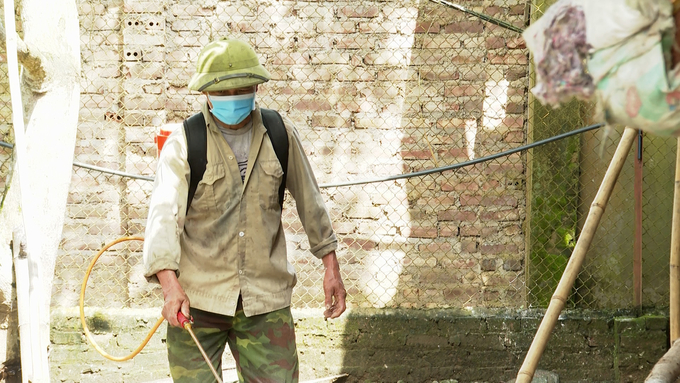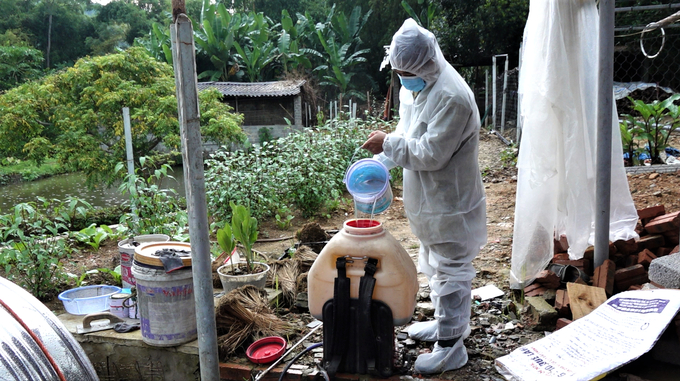November 25, 2025 | 17:37 GMT +7
November 25, 2025 | 17:37 GMT +7
Hotline: 0913.378.918
November 25, 2025 | 17:37 GMT +7
Hotline: 0913.378.918

Na Ri District, Bac Kan is running out of disinfectants for spraying and sanitizing amid the ongoing African swine fever outbreak. Photo: Ngoc Tu.
In Na Ri District, where the African swine fever is present, the entire district has only 248 liters of disinfectants left, which is enough for sanitizing for the next 2 weeks. If the disease spreads to neighboring areas, the demand will increase, potentially depleting the disinfectants immediately, causing disruption to the overall disease prevention.
Mr. Luong Thanh Loc, Vice Chairman of Na Ri District People's Committee, stated that the district can only sanitize the areas with outbreaks and not the surrounding areas under threat of infection, as the disinfectants could run out. To ensure disease prevention, the district will need around 1,000 to 1,500 liters of chemicals in the near future. The local authorities lack the funds to purchase the chemicals and have requested provincial assistance.
Similarly, in Pac Nam District, where African swine fever is also present, there are less than 200 liters of chemicals left. This quantity will only last for a short period, and if not replenished, it will soon run out.
"Currently, Pac Nam District is using the remaining resources conservatively. In the long term, additional chemicals are needed. If the demand for usage increases significantly, it will be difficult to manage and ensure disease prevention," stated Mr. Ma Van Tuan, Vice Chairman of Pac Nam District People's Committee.
While Pac Nam and Na Ri Districts are running out of disinfectants due to outbreaks, other localities within the province also have limited reserves.
Mr. Do Xuan Viet, Head of the Department of Livestock and Veterinary of Bac Kan Province, mentioned that the entire province has only over 1,000 liters of disinfectants left for sanitization. These chemicals have been distributed among districts and cities. If the African swine fever continues to spread or other diseases emerge in livestock, leading to an increase in demand for disinfectants in the near future, the province will run out of disinfectants.
"The bulk of these disinfectants were transferred from 2021 to 2022. In 2022, Bac Kan Province conducted a bidding process to purchase disinfectants and some types of preventive vaccines. However, no enterprises participated in the bidding process, resulting in its cancellation. Until now, in 2023, the entire province has not been able to purchase disinfectants for sanitization," added Mr. Do Xuan Viet for further information.

Due to the lack of enterprises participating in the vaccine and disinfectant bidding process in 2022, Bac Kan Province is currently facing a shortage of disinfectants for spraying and sanitization, causing difficulties in disease prevention and control. Photo: Ngoc Tu.
With only slightly more than 1,000 liters of disinfectants left, Bac Kan Province can temporarily transfer disinfectants from districts without outbreaks to areas with outbreaks to address the urgent situation. However, the quantity available for transfer is limited as other districts also need to retain a portion for contingency.
While unable to purchase new supplies, in 2022, Bac Kan Province received 10,000 liters of Han-Iodine 10% disinfectant chemicals as support from the Ministry of Agriculture and Rural Development's national reserve. These disinfectant chemicals were distributed among districts and cities. Since the beginning of the year, localities have used them up for sanitization. The disinfectant supplies currently in use and in reserve by the districts are leftovers from 2021.
In light of the potential depletion of supplies, Mr. Nong Quang Nhat, Vice Chairman of Bac Kan Province People's Committee, has requested the Department of Agriculture and Rural Development to promptly provide advice to the province for proposing central-level assistance from the national reserve. Additionally, the relevant departments and agencies need to clarify the reasons for the failure to conduct the bidding process for the purchase of disinfectants and certain types of vaccines. This will allow for solutions to be developed to organize procurement bidding in the near future.
At present, Bac Kan is experiencing prolonged rainy and humid weather conditions, which are conducive to the development of disease-causing agents among livestock. Over the past years, it has been evident that diseases frequently spread among livestock during this period. Therefore, supplementing disinfectants for disease prevention is of utmost importance. Furthermore, Bac Kan Province should also have contingency plans in place in case diseases among livestock spread extensively.
Translated by Nguyen Hai Long
/2025/11/24/3536-2-112800_176.jpg)
(VAN) Dong Nai now has tens of thousands of hectares of forests certified for sustainable management, and this area will continue to be expanded in the coming period.

(VAN) Vinh Ha hamlet (Dai Xuyen commune, Hanoi) is shifting away from small-scale farming as households adopt bioscurity into their breeder chicken models.

(VAN) Heavy rains make aquatic species more vulnerable to disease. Proactive water management and high-tech systems help farmers prevent outbreaks and protect yields.

(VAN) Greenhouses are shifting production mindsets in Binh Lu commune, enabling farmers to ‘weather the sun and rain’ and secure stable vegetable harvests throughout the year.

(VAN) Green transition is crucial for the Mekong Delta amid climate change and stricter standards, offering a path toward sustainability.

(VAN) Dong Thap promotes agricultural restructuring, forms large specialized farming zones, raises the value of agricultural products and develops toward ecological and high-tech directions.
/2025/11/22/4018-4-213342_747.jpg)
(VAN) The Mekong Delta Agricultural Experts Club has attracted 143 experts and researchers to participate in providing consultancy and contributing initiatives to the development of one million hectares of high-quality rice.